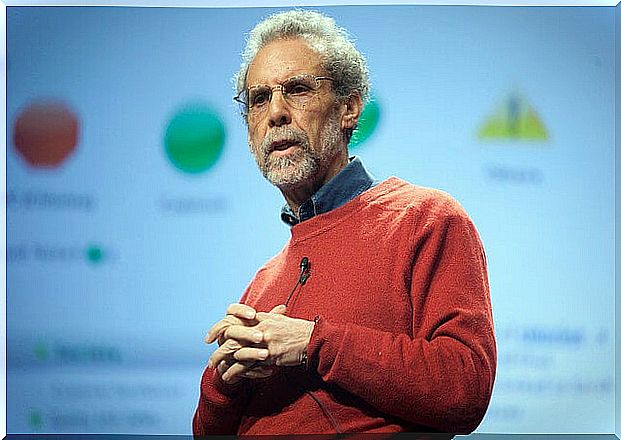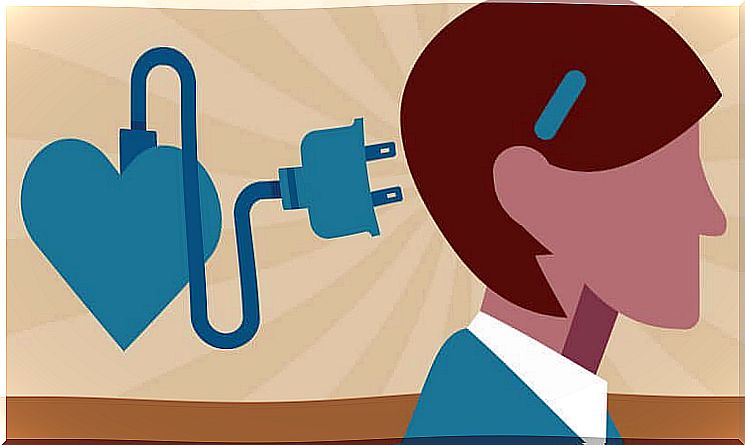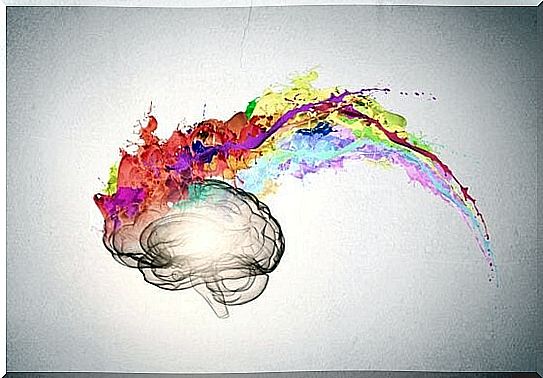Daniel Goleman And His Theory On Emotional Intelligence

A bright brain and a high IQ is of little use to us if we do not understand empathy, if we do not know how to read our own and other people’s emotions. To be foreigners of one’s own heart and of that social conscience where learning to connect, to manage fear and to be assertive is to put aside valuable capacities. Because emotional intelligence is, whether we want it or not, an essential pillar to be happy.
No one will be surprised if we say that today the debate about what intelligence is and is not seems not to have completely closed. Empirical evidence confirms, for example, the existence of Spearman’s “G” factor, understood as a basic and essential foundation that defines all intelligent behavior. We also have the triarchic theory of Robert J. Sternberg, and of course, the popular approach of multiple intelligences of Howard Gardner.
Where then is the so-called emotional intelligence of Daniel Goleman? Well actually it is interesting to know that that idea, that concept and that essence has always been present throughout the history of psychology. Professor Goleman did not formulate it, he only popularized it in 1995 thanks to his book Emotional Intelligence , of which he has already sold more than 5 million copies.
Edward L. Thorndike, for example, defined as early as 1920 what he called “social intelligence,” that basic ability to understand and motivate other people. David Wechsler, for his part, and in the 1940s, made it clear that no intelligence test could be valid if emotional aspects were not taken into account. Later, Howard Gardner himself would already lay the first foundations with the seventh of his intelligences, the so-called interpersonal intelligence, very similar without a doubt to the emotional one.
However, it was in 1985 that the term “emotional intelligence” first appeared thanks to Wayne Payne’s doctoral thesis, which was entitled A study of emotions: the development of emotional intelligence . Only 10 years later, the great power that emotions have over who we are, what we do and how we relate.

Daniel Goleman and Emotional Intelligence
Daniel Goleman started out as a journalist for The New York Times and is now the guru of Emotional Intelligence. He is past 70, he lives a very sweet autumn in his life and his serene smile and his penetrating and firm gaze call attention to him. It is as if he was always able to see beyond what the rest of us perceive, a man who does not miss details and who finds connections where others only see coincidences.
He always says that his passion for psychology came from his mother, a social worker specialized in psychiatry who accumulated books on neuroscience, on the human mind and the behavioral sciences. All those volumes decorated his childhood and his day to day life.
For a time they were little more than indecipherable texts to which he came with inexplicable fascination. Later, they were his motivation and his yellow brick road to become what he is now: the greatest disseminator of social intelligence in any of its aspects, educational, organizational, associated with leadership …
What really is emotional intelligence?
This dimension responds to another way of understanding intelligence beyond cognitive aspects, such as memory and the ability to solve problems. We speak above all about our ability to effectively direct ourselves to others and ourselves, to connect with our emotions, to manage them, to motivate ourselves, to curb impulses, to overcome frustrations …
- Emotional intelligence begins with self-awareness and also with social awareness. That is, when we are able to recognize emotions (and their impact) in everything around us.
- It also means understanding that a large part of our behaviors and decisions are based on emotions. The human being is an emotional creature that one fine day learned to think and reason. This may seem a somewhat controversial aspect but it is not without truth. Understanding it, assuming it will allow us to have greater control over our behavior.
The dimensions that make up Emotional Intelligence according to Daniel Goleman
Daniel Goleman defines that within his approach to emotional intelligence there are four basic dimensions that back it up. They are as follows.
1. Emotional self-awareness
It refers to our ability to understand what we feel and to always be connected to our values, to our essence. Something like this means having a kind of well-calibrated personal compass that will allow us to guide ourselves on the right path at all times. As long as we take into account those internal realities, that emotional world, we will know and act accordingly.
2. Self-motivation
Self-motivation highlights the ability to orient ourselves toward our goals. To recover from setbacks and focus all our personal resources on one goal, one objective. If we combine optimism, perseverance, creativity and confidence, we will overcome any difficulty to continue conquering triumphs and achievements.
3. Empathy
In our way of relating and interacting there is an aspect that goes beyond words. We talk about the emotional reality of each one. That which is expressed with gestures, with a particular tone of voice, with certain postures, looks, expressions … Deciphering all that language, putting ourselves in the place of the other and discovering what they are going through is empathy.
This capacity allows us not only to obtain information about those in front of us. But also, it helps us to establish stronger bonds, deeper social and emotional ties.
In addition, recognizing the emotions and feelings of others is the first step to understanding and identifying with the people who express them. Empathic people are those who, in general, have the greatest skills and competencies related to EI.
4. Social skills
And how do you relate to others? Do you communicate effectively and assertively? Do you know how to handle conflicts or differences? All these behavioral dynamics enhance or limit our ability to enjoy our relationships or not. To build healthy, comfortable and productive work environments. To shape more satisfactory relationships with your partner, family or friends.

As a curiosity, Daniel Goleman reminds us in his books of the need to be competent in these four areas. It is not worth mastering one or three. The emotionally intelligent person is effective in all of them. If not, we could have, for example, the classic manager trained in emotional intelligence but who has only come to assume self-awareness, but not his ability to empathize with others, to understand those worlds alien to his own needs. and values. We must therefore see these four areas as a whole.
Emotional intelligence is learned and can be enhanced
Both in his book Emotional Intelligence (1995) and Social Intelligence (2006), the author explains that part of this ability, of this capacity, is found in our own epigenetics. That is, it can be activated and deactivated, depending on the emotional and social environment in which we grow up, in which we are educated.
However, and here lies the real magic, emotional intelligence responds to that brain plasticity where any stimulus, continuous practice and systematic learning creates changes, builds connections and new areas where we can be much more competent in each of the 4 areas mentioned above.

Daniel Goleman also points out the need to educate children through this approach. Whether at home or at school, we should all be able to create a meaningful and valid context in Emotional Intelligence. On the other hand, as far as the adult world is concerned, we know that in our day-to-day courses of all kinds are not lacking, that seminars, conferences are given every day and that we all also have multiple books and magazines at our fingertips to train ourselves. .
Achieving it is a matter of will, perseverance and applying that real awareness where to make present and constant those keys that Professor Goleman points out to us in his works:
- We must detect the emotion behind each of our actions.
- It is necessary that we expand our emotional language (sometimes it is not enough to say “I am sad”, we have to be more specific. “I am sad because I feel disappointed, somewhat angry and confused at the same time”).
- Control what you think to control how you behave.
- Look for a reason for the behavior of others, be able to understand the perspectives and emotional worlds of others.
- Express your emotions assertively.
- Improve your social skills.
- Learn to motivate yourself and fight for those goals that can bring you closer to true happiness.
The benefits of enhancing emotional intelligence
In addition to ensuring success in what we set out to do, Daniel Goleman shows us other benefits by developing our emotional intelligence:
Higher productivity
This author states that people with well-developed emotional abilities are more prone to effectiveness. Since, they can control those habits that enhance their own productivity. On the other hand, those who cannot control their emotional life, maintain internal conflicts that sabotage their ability to work with attention and precision.
Better life quality
Unpleasant emotions and toxic relationships represent risk factors that lead to the appearance of some diseases. Therefore, it is important to know how to handle those disturbing feelings (anger, anxiety, depression, pessimism, etc.). Well, when the damaging effects of these emotional states become chronic, the medical consequences can be severe.
Optimize learning and academic success
Daniel Goleman also claims that prolonged emotional stress interferes with children’s intellectual faculties, thus hindering their ability to learn. Likewise, he defends that achievement does not depend a lot on talent but on the ability to keep going despite failures.
Enrich our social life
Emotional intelligence also includes the ability to properly relate to the emotions of others, as well as being able to express our feelings appropriately. These two factors help us to establish healthier and more lasting bonds.
To conclude, beyond that figure offered by the classic standardized intelligence tests, there is another sphere, another dimension and another intelligence with which we can achieve success. We talk about that personal success where we are able to adjust behaviors and emotions, where we can better connect with others, where we live in balance and harmony feeling competent, free, happy and personally fulfilled. Achieving it is an adventure to conquer on a daily basis.









